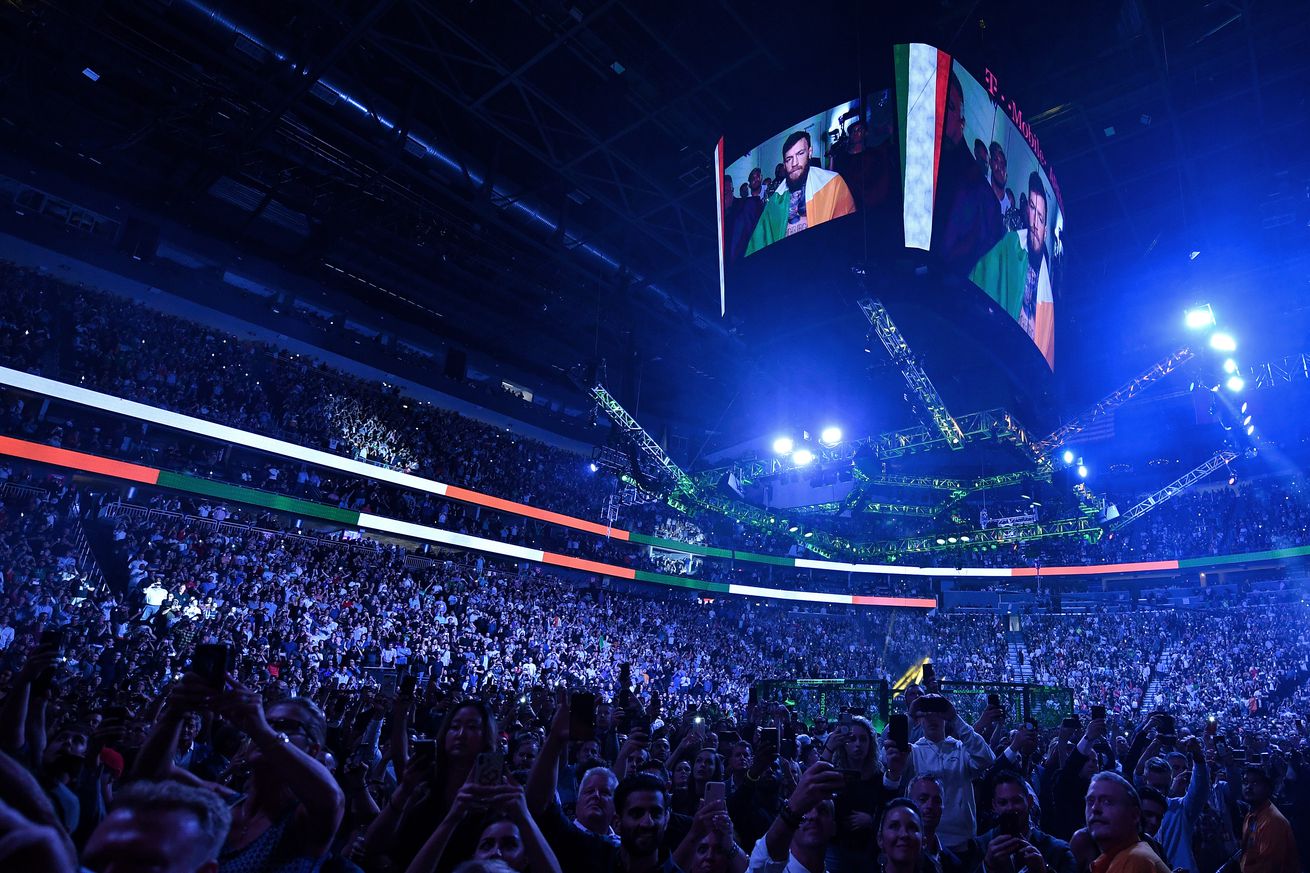
Photo by Brandon Magnus/Zuffa LLC/Zuffa LLC via Getty Images
Thanks to the UFC Anti-Trust lawsuit we now know at least one formula for fighter compensation based on pay-per-view buys.
Thanks to the UFC Anti-Trust Lawsuit — which sees former fighters suing ZUFFA LLC over their claims that the corporation is running a monopsony within mixed martial arts — we are learning new and detailed information about the way the UFC has conducted business over the past few decades.
Some of the most revealing details come courtesy of previously redacted passages from an expert report composed by Hal J. Singer, an expert witness for the Plaintiffs. Passages from Singer’s report come to us thanks to Jason Cruz, of MMAPayout and Bloody Elbow’s ‘Show Money’ podcast (hosted alongside John S. Nash and Paul Gift).
One of the more interesting snippets from Singer’s report details the UFC’s system for paying fighters’ based on the performance of pay-per-views they appear on. It has long been known that champion UFC fighters might earn a percentage of PPV buys, but the formula by which this is calculated has seldom been explained.
In Singer’s report he outlines one example of how fighters might receive PPV ‘points’. See that snippet below.
/cdn.vox-cdn.com/uploads/chorus_asset/file/18939531/Screen_Shot_2019_08_01_at_5.15.31_PM.png)
Hal J. Singer
The snippet outlines an ‘example’ model that includes fighters receiving $1.00 for every PPV ticket sold between 200,000 and 400,000 tickets. Compensation for tickets sold between 400,000 and 600,000 is given as $2.00 each. Then, tickets sold over the 600,000 threshold result in a $2.50 reward each.
Singer’s report includes some contradictory information — direct from past and present UFC brass. The report mentions negotiations between former UFC bantamweight champion Holly Holm and the UFC over potential PPV points. Presumably this was at a time when Holm was not a champion, since UFC matchmaker Sean Shelby is quoted from an email as saying “a PPV component as a challenger is a dealbreaker.”
UFC president Dana White is quoted from a responding email stating that, “For ppv bonus she must be defending (a championship).”
However, it seems the UFC does not always follow this rule. Singer’s report reveals that at 2015’s UFC 183: Silva vs. Diaz both Anderson Silva and Nick Diaz received PPV shares. This is despite neither Silva nor Diaz being reigning UFC champions at the time. Singer’s analysis in the paragraph states that both fighters may have received the shares because of their status as former champions (UFC middleweight champion in the case of Silva and WEC and Strikeforce welterweight champion in the case for Diaz).
If the example PPV share formula was used for UFC 183, that would mean that Silva and Diaz received an additional $725,000 (for 650,000 buys*) on top of their disclosed earnings of $800,000 and $500,000 respectively.
If that example was in effect for other notable UFC PPVs, that would have resulted in the following paydays in connection with some of the biggest pay-per-views in promotional history:
UFC 229: Khabib Nurmagomedov (c) vs. Conor McGregor, October 6th, 2018. 1,900,000 buys equals an estimated PPV share of $3,850,000.
UFC 202: Conor McGregor vs. Nate Diaz II, August 20th, 2016. 1,650,000 buys equals an estimated PPV share of $3,225,000.
UFC 100: Brock Lesnar (c) vs. Frank Mir (c) and Georges St-Pierre (c) vs. Thiago Alves, July 11th, 2009. 1,600,000 buys equals an estimated PPV share of $3,100,000.
UFC 196: Conor McGregor vs. Nate Diaz and Holly Holm (c) vs. Miesha Tate, March 5th, 2016. 1,317,000 buys equals and estimated PPV share of $2,392,500.
UFC 205: Conor McGregor (c) vs. Eddie Alvarez (c), November 12th, 2016. 1,300,000 buys equals an estimated PPV share of $2,350,000.
UFC 193: Ronda Rousey (c) vs. Holly Holm, November 15th, 2015. 1,100,000 buys equals an estimated PPV share of $1,850,000.
UFC 207: Amanda Nunes (c) vs. Ronda Rousey, December 30th, 2016. 1,100,000 buys equals an estimated PPV share of $1,850,000.
UFC 116: Brock Lesnar (c) vs. Shane Carwin, July 3rd, 2010. 1,060,000 buys equals an estimated PPV share of $1,750,000.
UFC 91: Randy Couture (c) vs. Brock Lesnar, November 15th, 2008. 1,010,000 buys equals an estimated PPV share of $1,725,000.
UFC 168: Anderson Silva (c) vs. Chris Weidman and Ronda Rousey (c) vs. Cat Zinagno, December 28th, 2013. 1,025,000 buys equals an estimated PPV share of $1,662,500.
UFC 66: Chuck Liddell (c) vs. Tito Ortiz, December 30th, 2006. 1,050,000 buys equals an estimated PPV share of $1,625,000.
UFC 200: Miesha Tate (c) vs. Amanda Nunes, September 7th, 2016. 1,009,000 buys equals an estimated PPV share of $1,622,500.
UFC 194: Jose Aldo (c) vs. Conor McGregor, December 12th, 2015. 1,025,000 buys equals an estimated PPV share of $1,662,500.
UFC 114: Quinton Jackson vs. Rashad Evans, May 29th, 2010. 1,000,000 buys equals an estimated PPV share of $1,600,000.
UFC 92: Forest Griffin (c) vs. Rashad Evans, December 27th, 2008. 1,000,000 buys equals an estimated PPV share of $1,600,000.
UFC 158: Georges St- Pierre (c) vs. Nick Diaz, March 16th, 2013. 950,000 buys equals an estimated PPV share of $1,475,000.
UFC 217: Michael Bisping (c) vs. Georges St-Pierre, Cody Garbrandt (c) vs. T.J. Dillashaw, and Joanna Jedrzejczyk (c) vs. Rose Namajunas, November 4th, 2017. 875,000 buys equals an estimated PPV share of $1,287,500.
UFC 214: Daniel Cormier (c) vs. Jon Jones II, July 29th, 2017. 850,000 buys equals an estimated PPV share of $1,225,000.
UFC 182: Jon Jones (c) vs. Daniel Cormier, January 3rd, 2015. 800,000 buys equals an estimated PPV share of $1,100,000.
The numbers above must be taken with a grain of salt. It’s not clear how often the example PPV share model was used throughout the years of the UFC’s operations. It is also not guaranteed that all the headliners, or even all the defending champions, received PPV shares. In Singer’s report he notes that only a ‘small number of top-tier fighters’ receive such compensation.
/cdn.vox-cdn.com/uploads/chorus_asset/file/18940347/Screen_Shot_2019_08_07_at_10.38.03_AM.png)
Hal J. Singer